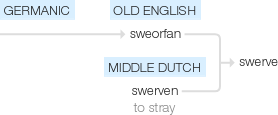Swerve
Old English sweorfan ‘depart, leave, turn aside’, of Germanic origin; related to Middle Dutch swerven ‘to stray’.
wiktionary
From Middle English swerven, swarven, from Old English sweorfan(“to file; rub; polish; scour; turn aside”), from Proto-Germanic *swerbaną(“to rub off; wipe; mop”), from Proto-Indo-European *swerbʰ-(“to turn; wipe; sweep”). Cognate with West Frisian swerve(“to wander; roam; swerve”), Dutch zwerven(“to wander; stray; roam”), Low German swarven(“to swerve; wander; riot”), Swedish dialectal svärva(“to wipe”), Icelandic sverfa(“to file”).
etymonline
swerve (v.)
c. 1200, "to depart, go make off; turn away or aside;" c. 1300, "to turn aside, deviate from a straight course;" in form from Old English sweorfan "to rub, scour, file away, grind away," but sense development is difficult to trace. The Old English word is from Proto-Germanic *swerb- (cf Old Norse sverfa "to scour, file," Old Saxon swebran "to wipe off"), from PIE root *swerbh- "to turn; wipe off." Cognate words in other Germanic languages (Old Frisian swerva "to creep," Middle Dutch swerven "to rove, roam, stray") suggests the sense of "go off, turn aside" might have existed in Old English, though unrecorded. Related: Swerved; swerving.
swerve (n.)
1741, from swerve (v.).
